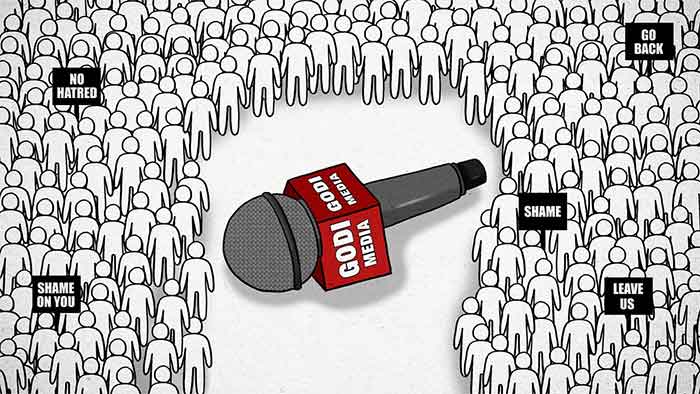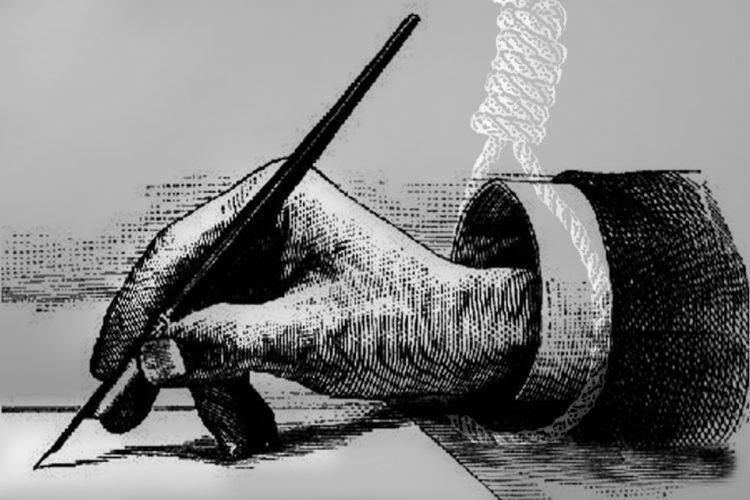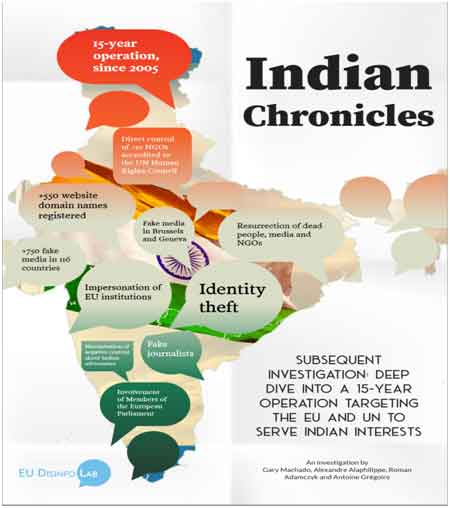
Only recently, the Chief Minister of Goa warned the people of the State in rough and ready terms: ‘I will not brook any criticism of the PM’. In the ever-widening threat of trampling public discourse and media freedom, I pondered as to how long more one would be able to read a valid newspaper, or tune into critical news coverage on television, or join a civil society protest given the threats being flung on critical media spaces and peoples movements prone to putting out truth about reality. The jarring admonition of the Goa CM shunned discretion; other CMs have chosen to be more subtle, though equally strident about putting popular engagement and a vibrant media in their place. The political class demands that a subservient public co-habit with the discontents of democracy. The result is that India must now cope with a dominant ‘Godi (lapdog) Media’
Democratic space is shrinking with immense rapidity in the country. Dissent with the official line is valid pretext for calling out sedition, for detention without trial, and being stifled in carrying out political functions in non-party political spaces. The term sedition, itself, is being mis-defined. Truth-telling that exposes government miscarriage of governance is good enough pretext for intelligence and law-enforcement to slap cases of treason. The illogicality of such cases has gained outrageous proportions and the frequency is way too frequent.
The main victim of pretending democracy is the media. Once deemed as the propagator of honest political news coverage, today the co-opted versions of the media have flouted that idea and reduced themselves to a sham instrument of ruling party propaganda. It’s bad enough that the front page of mainstream newspapers do not carry front page news any longer. Such news begins in page two or three. Meanwhile one must make do with full-page front-page advertisements announcing some mega project worth so-and-so crores.
In my early teens, I would wait steadfastly for the delivery-man for my early morning quota of news. As a kid, I invariably went straight to the sports page. Growing up among politically conscious mentors, I became more conscious and would scan page one, then the inside pages, followed by the editorial.
Between then and now, there are miles of differences in the nature of news content. There is a decline in the numbers of newspapers that make sagacious and upright reading. We used to be reminded in our youth that what we read in the ‘right’ newspapers and journals, and books, is the stuff that creates in us an informed view of society. The right kind of reading prompts one to query society and politics and ask ‘why’ and ‘why not’.
I am a product of the generation of the ‘irate sixties’. We did not have internet then; but what the heck? We had public libraries, street side vendors of newspapers and magazines, mimeographed newsletters and articles, and competing political graffiti that always stopped passers-by with food-for-thought. These were our internet-plus sources. News, in those good old times, had feeling and content. It embraced debate, deep searching, and a spirit of enquiry.
Today, propaganda has hijacked the space of real news. ‘The Real Truth/Alternative media’, flaunt courage and veracity with news-analysis. They are a rare tribe who demonstrate that integrity counts. Through their coverage, they illustrate how the risks and hardships courageous journalism entails must be taken if our democracy must be agile and alert. It is a notorious coincidence that India is among eleven countries that has either imprisoned or killed journalists.
Two dynamics, in the main, have set the stage for the sad state of the mass media in our times. The Corporatization of the media has dented its moral fiber. Up until the corporate media made its dawn, there existed media outlets, often at opposite ends of the political spectrum. A survey of the diverse reportage allowed the reader to form opinions based on a vibrant political discourse. There were often intense contestations among friends in coffee houses, and on the campus, youth movements, and social action entities. Readers discerned and chose perspectives. Politics was not a monologue and monolith. The media contributed hugely to this phenomenon of political pluralism. It made the media an indispensable and vital ingredient of valid democratic space.
Not anymore. An anchor of a prominent television station described the manifesto of a party which, he argued, was brutally communal, and anti-Hindu. His claim was recurrent. He accused the Congress of issuing a manifesto promising ‘Muslim-only’ hospitals. What he did not report was that the line was changed to say “more hospitals accessible to minorities”. Partial truths or acceptable corrections of claims are conveniently omitted leaving charred remnants of propaganda to fill the hate lines. What the channel also left uncommented was that many private and public hospitals view poor Muslims as the ‘M-factor’ who has no access to proper medical care because it is unaffordable. And one queries: Why impose a prejudiced façade of truth to the viewer?
Corporatization has inaugurated an era of ‘opiate news’. Loud anchors and political sycophants occupy most nightly news panels. Dissenters are snubbed and humiliated. The anchor curves the conversation towards an encoded ‘truth’. Debates and news reinforce political stereotypes. The discerning viewer and listener have dropped out of this deceptive news circuit preferring to dump the screechy nonsensical performances for a calmer evening. After all, bona fide truths do still come from the pages of ‘The Real Truth Media’ and YouTube recordings of fearless, bold, and incisive newsmakers.
Corporates represent the ruling classes; the rich. It is their exclusive intention to promote societal viewpoints that are numbing and accepting of the dominant narrative. Hence the sub-sections of industry are trained to resemble and ape their paymasters and swallow the opiate that transforms them into dull, boring profit bearers for the corporates and perpetuate the culture of domination by a few and function as the filter between the rich and lower classes. Corporate news-baiters have lost the same audiences who once dutifully switched on television to know more about their world. The new aspiration to foray into the global news market will simply droop unless it can serve as valid enough to attract a global audience. You cannot be an ‘instant’ Al Jazeera with the non-quality that some of our television broadcasts cough up.
Creating validity from falsehood is a phenomenon now categorized as ‘paid news’. Sadly, an invective on such a story-line when repeated and communicated even for just an hour will have accomplished the mischief of completing the damage. The famous Shakespearian line captures this (I paraphrase): ‘Mischief, thou are afoot; take thou what course thou wilt!’ This kind of journalism is born in cynicism and fascist traits.
Fake news (often paid for) is social and political poison. Not only does it confirm the desperation that politicos use through their compliant subordinates in the mainstream and social media; it is a form of terror used to scare-monger. News about intellectuals-turned-Maoists is fake news that naïve citizens, and politically biased groups, ardently swallow. That missionaries are tirelessly engaged in conversions of the poor and vulnerable is fake news. In the above two examples, there is neither corroboration of the social claim nor is there evidence that justifies the scare-crow tactic. Regardless of the vulgarity of fake news, the damage is done once in circulation, and once the streets have internalized the news, it is too late for damage control.
News and views are, however, not the exclusive making of the media; whether it is via newspapers or television. Civil society, the human rights community, social movements are also active in creating news and shifting perceptions about social and political reality at grassroots level. When their views challenge government and discredit botched governmental policy and implementation through consciousness-building, and, thus, mobilize masses (CAA protests were an example), trouble brews. They are disrupted, banned, raided, their FCRAs withdrawn, and investigations launched to stifle and cripple their functioning.
Many NGOs and civil society have either closed shop or changed their discourse to suit the powers-that-be. For, after all, information, whether via the media or public discourse, is more than just about raw facts, but the dynamics behind the making of facts-on-the-ground and the implications of those dynamics for the polity. Ruling classes and political dispensations prefer an uninformed, hushed public that neither care nor dare to make truth openly known.
In recent times, the banning of organizations has proven an open threat to democracy. India claims to be the largest democracy, but it is pretending democracy while practicing tyranny. Has the country reduced itself to replicating the fascist Israeli model which resorts to bulldozing bans, imprisoning people, anytime an organization has exposed the government beyond limits the government can tolerate? The UAPA resembles the Administrative detention law in Israel idea-for-idea and is rooted in a common ideology- patently fascist in nature. The UAPA is a draconian measure that has thrown intellectuals into prison on trumped up charges. Their only (supposed) crime, if that is one, was that they dared to expose the contradictions of the injustices which punctuate the Indian social reality. Evidence has now surfaced that Fr. Stan Swamy who died in custody was framed on charges that were supplanted by a hacker.
Levels of political tolerance have slid hugely. It has reached a nadir with newspapers and media channels being shut down, bought off, silenced or simply harassed into subservience. Reporters and Op-ed writers are interrogated and/or slapped with cases. There can be no denying that fear of arrest and loss of jobs, has seen many a journo toning down their language and tenor of political commentary. The best quit; while potential talent won’t join. Yet others choose status quo in return for material gains.
Nostalgia is not enough to return to an era gone by. A vibrant and alert civil society is under duty to protect freedom of the press, and, by extension, freedom of those who seek to reclaim democracy as defined in the Universal Declaration of Human Rights. The legitimate role and function of the media today is to free democracy from the clutches of politics that undermines human freedom and affirms justice, political pluralism. People’s voluntary participation is the precondition for an idyllic political system. When that is stifled fascism will take root and destroy the social and political fabric of society.
Social Movements, human rights communities, intellectuals, social activists working with progressive media components must assume the role of being the fulcrum of thrusting change that frees society from the clutches of autocratic tendencies.
Ranjan Solomon is a political commentator and human rights activist
This article was first published in “The Citizen“















































